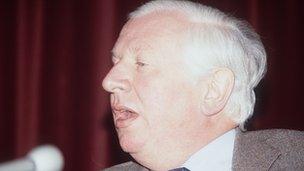NI state papers: Paisley 'accepted nationalist needs'
- Published

Ian Paisley secured a third of the vote in the European election of 1984
After securing a third of the vote in the 1984 European election, DUP leader Ian Paisley told the government he realised the need to treat the nationalist community generously.
He also revealed he viewed Articles 2 and 3 of the Irish Constitution as an "irritant" rather than a major obstacle to progress, according to confidential files released in Belfast.
Mr Paisley made the comments during a private meeting with Northern Ireland Secretary, Jim Prior, at the House of Commons on 25 June, 1984.
Mr Paisley had requested that there should be no officials present.
The meeting, Mr Prior later informed colleagues, was "entirely cordial".
Mr Paisley said he was ready to discuss political arrangements with SDLP leader John Hume "and that such discussions would be helped if there were the least possible intrusion by the UK government".
Mr Prior pointed out that the difficulties in reaching an accommodation should not be underestimated.
He would be announcing consultations with the Dublin government, but the DUP leader said he had not objected to this.
It was the need for majority consent in Northern Ireland that was "the real guarantee against any inappropriate settlement" with the Dublin government, he said.
By the same token, Mr Paisley described Articles 2 and 3 of the Republic's Constitution, which claimed sovereignty over Northern Ireland, as an "irritant" rather than a substantial obstacle to a settlement.
Regarding talks with Mr Hume, "Mr Paisley commented that the SDLP had got too much in the arrangements of 1973-74 and would have to reconcile themselves to less on this occasion".
'Surprised and pleased'
However, Mr Prior pressed the DUP leader to recognise that regardless of that, without a significant Irish dimension, the SDLP could not be expected to join the assembly.
The report noted that the secretary of state was "surprised and pleased by Dr Paisley's apparent wish to be conciliatory", although it was impossible to know how long this would continue.
The two men met again at Stormont House on July 10, 1984.
Mr Paisley at once objected to the secretary of state's reference to tripartite talks, declaring that the Irish government "had no locus to participate in devising arrangements for Northern Ireland".
He had an assurance on this point from the prime minister, Margaret Thatcher, herself.
The DUP leader said he wished to persuade the SDLP to join the assembly but "was adamant that the Forum Report could not be discussed by the DUP".

Jim Prior was pleased by Mr Paisley's apparent wish to be conciliatory
In response, Mr Prior again pressed the view that the concessions which the SDLP required would include some form of Irish dimension, "short of change of sovereignty" and arrangements which gave the minority a voice in government, even if it was less than power-sharing.
Mr Paisley thought that Mr Hume was too dependent on the belief that the two governments could jointly impose a solution pointing towards a united Ireland.
Also, the SDLP leader was "in danger of being outflanked by Sinn Fein".
In conclusion, however, "Dr Paisley acknowledged that, to secure any agreement, it would be necessary to treat the representatives of the minority community generously".
He would be ready for them to have a share of committee chairmanships.